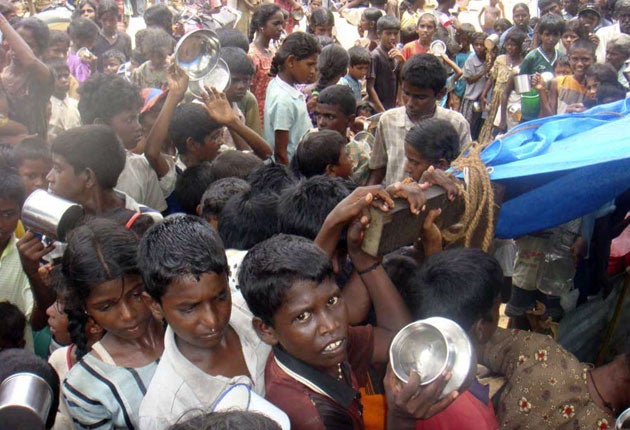Sri Lanka eyewitness: More refugees are arriving – and there's not enough shelter

The eight-year-old girl, when we found her, was totally folded in on herself, and unable to speak. She'd witnessed her father and sister die from shelling in Vanni, and then her mother was shot on the way back. The girl was left with just her brother at her side. But in the chaos of their arrival at the temporary camps along with tens of thousands of other civilians, the two had been separated.
A fifth of children in the camps where we're providing aid are either missing or separated from one of their parents. Those who have reached safety speak vividly of the terror of separation from their families, while others describe the horror of fleeing from the "no-fire" zone. Many youngsters are trying to cope with the trauma of what they have experienced entirely on their own.
There are more than 100,000 people in the government camps now – and still more are arriving. There's nowhere near enough shelter. As soon as we got out of the car yesterday, a huge crowd came towards us crying, shouting and telling us their horrific stories. One breastfeeding woman had lost her newborn in the panic. Many simply have no idea where their families are. Some told me their relatives had died along the way.
Families are arriving malnourished and dehydrated – most haven't received food for up to three days and probably hardly any water either. Some have been wearing the same clothes for weeks. We've handed out hygiene kits, and kits for mothers with small babies, sleeping mats, bed sheets and jerry cans but we're running short of clothes. We thought there were 300 families per block, but there are almost double that number. Apart from basic supplies we're trying to establish areas where professional counsellors can organise structured play, and give kids a chance to talk with other children their age. The first step is just to get them smiling again, and then drawing, which is a less painful way of relating their experiences than by talking about them. It will take years to help them come to terms with what's happened, but this is a start.
One of the biggest priorities now has to be to reunite lost or orphaned children with their remaining family members. The authorities say they've managed to bring together 1,000 families. But there's a daunting amount of work to do and it has to be done urgently as these children are vulnerable.
The writer is an aid worker with Save the Children in northern Sri Lanka. For information about their work go to www.savethechildren.org.uk/srilankacrisis
Subscribe to Independent Premium to bookmark this article
Want to bookmark your favourite articles and stories to read or reference later? Start your Independent Premium subscription today.

Join our commenting forum
Join thought-provoking conversations, follow other Independent readers and see their replies